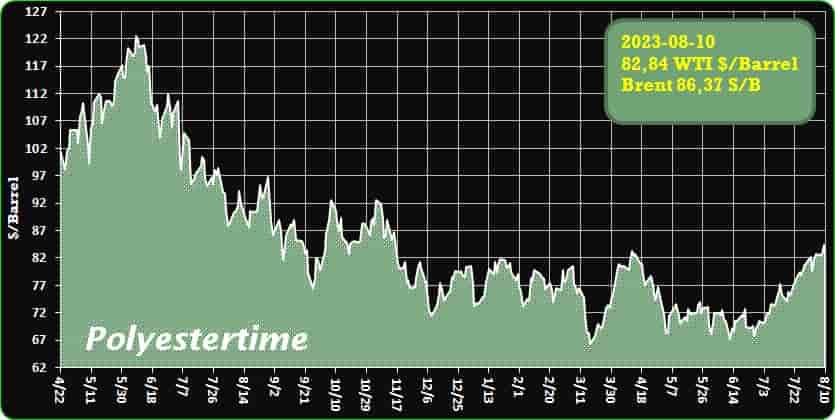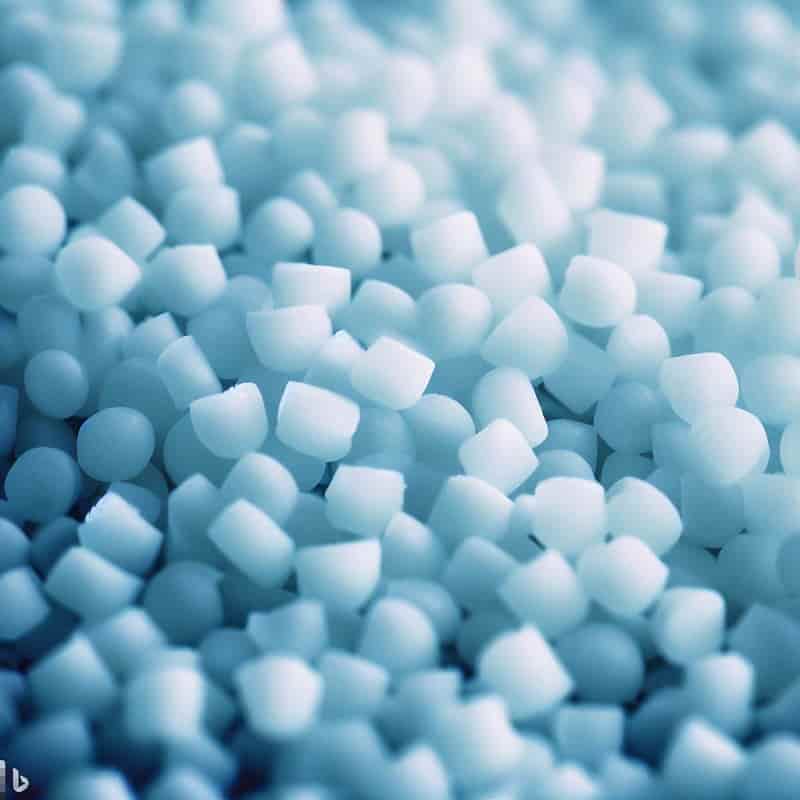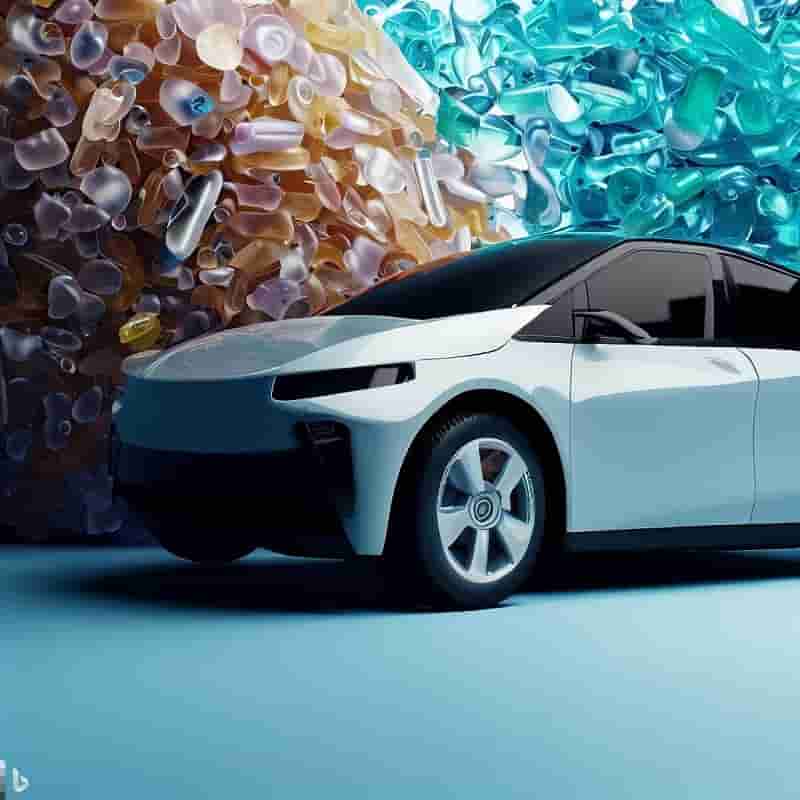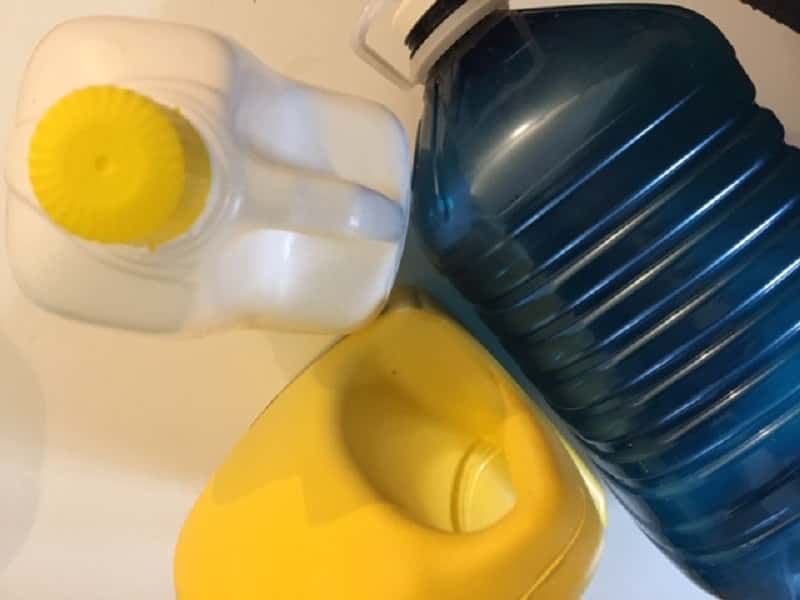r-PET Bottles biodegradability – r-PET releases more toxic substances than virgin PET? 10-08-2023 - Arhive
r-PET Bottles biodegradability
Crude Oil Prices Trend

Crude Oil Prices Trend by Polyestertime
Thailand Witnesses Landmark Debut of 100% Recycled PET Beverage Bottles
In an exciting collaborative effort, ALPLA and PTT Global Chemical (GC) have proudly unveiled Thailand’s inaugural food-grade rPET (recycled PET) for public consumption. This pioneering achievement is already making waves as it materializes into Thailand’s premier 100% rPET beverage bottles, as reported by Petnology.
Stepping into this groundbreaking transition, Pepsi and Minere, two prominent beverage brands within the Thai market, have embraced the use of premium Post-Consumer Recycled (PCR) material from ENVICCO for their plastic bottle production. A significant stride, this feat derives from the robust partnership between ALPLA and PTT Global Chemical (GC), who formally inaugurated an advanced recycling facility situated in the Rayong province in September 2022. The introduction of Thailand’s foremost FDA-certified food-grade rPET and the subsequent debut of the nation’s initial 100% rPET bottles mark a pivotal milestone in the collaboration between the joint venture and the dynamic beverage industry. r-PET Bottles biodegradability
Bernd Wachter, ALPLA’s Corporate Director of Circular Economy & Recycling Asia, underscores the multifaceted benefits of investing in the circular economy. He emphasizes that such an investment doesn’t merely echo positively in environmental realms, but also catalyzes economic growth and enriches society by fostering meticulous and efficient recycling practices. This, in turn, culminates in the development of sustainable, accessible, and innovative products while simultaneously nurturing job creation.
ENVICCO, the driving force behind this initiative, boasts an impressive annual production capacity of 30,000 tons for recycled PET (rPET) and an additional 15,000 tons dedicated to recycled HDPE (rHDPE). As a prominent player in the recycling landscape, ENVICCO stands tall as one of Asia’s largest recycling facilities. Their mechanical recycling process adheres rigorously to stringent quality, safety, and efficiency benchmarks, a testament to their dedication to producing food-grade PCR material of the highest calibre. The resulting rPET, aptly labeled “InnoEco,” has successfully garnered certification from the U.S. Food and Drug Administration prior to obtaining the green light from Thai regulatory authorities.
It’s noteworthy to mention that ALPLA Group has further bolstered its commitment to the UK market through the strategic acquisition of iTEC Packaging’s Mansfield-based plant. iTEC Packaging, renowned for its expertise in injection moulding, thermoforming, extrusion, and compression moulding, has a manufacturing facility specifically geared towards the production of closures, primarily catering to the dairy sector while also servicing other facets of the food and beverage industry. r-PET Bottles biodegradability
In conclusion, Thailand’s entrance into the era of 100% recycled PET beverage bottles heralds a momentous achievement driven by the synergy between industry giants ALPLA and PTT Global Chemical (GC). With Pepsi and Minere spearheading the adoption of premium Post-Consumer Recycled (PCR) material from ENVICCO for their plastic bottles, this pivotal stride underscores the fusion of sustainable practices and innovative solutions. This leap not only showcases ALPLA and PTT Global Chemical’s commitment to fostering a circular economy but also sets an encouraging precedent for other sectors to follow suit. As Thailand takes its first momentous steps towards a greener, more sustainable future, the ripple effects of this endeavor are poised to resonate both locally and globally.

Amidst the relentless surge of the plastic waste crisis, scientists have ventured into a realm of possibility that could revolutionize the trajectory of plastic disposal – harnessing the potential of starch to amplify the biodegradability of a polymer blend
This pioneering endeavor presents a beacon of hope in the pursuit of sustainable alternatives to conventional plastics, with a bio-based polymer blend that exhibits compostability in both domestic and industrial settings.
Rafael Auras, an esteemed authority in packaging sustainability at Michigan State University, accentuates the gravity of the predicament, both in the United States and worldwide. The escalating dilemma of waste, particularly plastic waste, has reached a critical impasse. An alarming revelation surfaces: less than 10 percent of plastic waste in the US undergoes recycling, leaving a substantial portion languishing as discarded refuse or scattered detritus. The consequences are profound, intertwining economic strains, environmental degradation, and potential health hazards. r-PET Bottles biodegradability
Against this backdrop of urgency, Auras elucidates a solution burgeoning with promise. “By forging the path towards biodegradable and compostable products, we can divert a portion of the mounting waste,” Auras declares. The profound impact of this transformation resonates deeply. A potential reduction in landfill contributions could signify a substantial leap toward rectifying the existing waste conundrum.
Yet, the benefits extend far beyond waste reduction. The envisaged plastics earmarked for composting would obviate the need for rigorous decontamination, circumventing a critical roadblock in efficient plastic recycling. The arduous choice that recycling facilities routinely confront – allocating resources for the ardent cleansing of soiled plastic or opting for outright disposal – could be mitigated. Imagine a coffee cup or a microwave tray embellished with stubborn tomato sauce residues; an innovative paradigm emerges. The conventional need for thorough rinsing or washing would be supplanted by the simplicity of composting.
Central to this groundbreaking breakthrough is the integration of starch. The material at the heart of the process, polylactic acid (PLA), has enjoyed an established tenure in packaging for over a decade. Derived from plant sugars rather than fossil fuels, PLA boasts an environmentally favorable heritage. The blend of PLA is known to be biodegradable within industrial composters, which employ conditions conducive to the decomposition of bioplastics. However, the prospect of rendering PLA compostable at the domestic scale appeared, at first, to be an insurmountable obstacle. r-PET Bottles biodegradability
The conundrum lies in the fact that PLA, in its natural state, is impervious to microbial consumption. A vital transformation must transpire to make it suitable nourishment for microorganisms. Industrial composting settings can facilitate this transition, but the process unfolds at a sluggish pace. Pooja Mayekar, a doctoral candidate in Auras’ laboratory and lead author of a study featured in ACS Sustainable Chemistry & Engineering, emphasizes the hurdle: “Microbes can’t readily break down and utilize PLA as food.” The envisaged solution bridges the gap – a carbohydrate-derived component named thermoplastic starch infused into PLA. This symbiotic blend provides a palatable feast for composting microbes while the PLA undergoes degradation.
However, the journey toward viable solutions is multifaceted. Auras underscores that while the research showcases the feasibility of entirely compostable bio-based plastic packaging, this milestone does not guarantee immediate commercial adoption. The challenges traverse technical impediments, extending their reach into the realms of social dynamics and behavioral patterns. The crusade against plastic waste is not a solitary quest; it mandates a collective transformation in perspectives and actions.
The realm of public perception harbors an essential yet somewhat erroneous notion – the belief that biodegradable and compostable materials wield the power to dissolve swiftly and seamlessly within any environmental setting. In actuality, these materials necessitate specific conditions, reminiscent of those found within active compost, to facilitate timely decomposition. The consequence of misapprehension is that improperly disposed biodegradable plastics linger as litter in the environment, rather than adhering to the intended ecological cycle. r-PET Bottles biodegradability
Amidst these challenges, the crux remains unyielding. The technology conceived does not advocate for the perpetuation of littering under the guise of biodegradability. Rather, it beckons for conscious waste management, steering individuals to embrace responsible composting practices both at home and within waste-management infrastructures.
As the conversation transcends the confines of blame-shifting, an indelible message takes root: the evolution of plastic management demands a transformation of perspectives, behaviors, and systems. The alliance between science and society is critical, envisaging a realm where starch-infused plastics signify not merely an alternative but a paradigm shift towards a circular and conscientious waste-management ethos.

China’s Economic Landscape: Slipping into Deflation Amidst Consumer Price Decline
In a disconcerting turn of events, China’s economic trajectory has taken a troubling dip into the territory of deflation. This is exemplified by the alarming drop in consumer prices, marking the first such occurrence in over two years. The recent data, released by China’s National Bureau of Statistics on a Wednesday, unveils a 0.3% contraction in the Consumer Price Index (CPI) for the month of July when compared to the same period last year. This marked decline highlights a worrying trend of weakening demand within the nation’s economic landscape. r-PET Bottles biodegradability
The multifaceted effects of this defla tionary slip are evidenced across various sectors. A comprehensive review of the CPI components for July underscores the widespread nature of the phenomenon. Categories spanning from food to transportation and household goods have all witnessed a downward spiral in their pricing. Notably, the price of pork has plummeted by a staggering 26%, whereas vegetable prices have recorded a 1.5% descent. These numbers collectively hint at the broader economic shifts taking place within the nation.
The realm of producer prices, as gauged by the Producer Price Index (PPI), offers an equally concerning perspective. The PPI, which measures the costs of goods at their initial stages of production, has recorded a distressing 4.4% drop in July when compared to the preceding year. This latest contraction in the PPI is emblematic of a concerning pattern, marking the tenth consecutive month of decline. This consistent decline further solidifies the narrative of deflation, with implications spanning across the industrial and manufacturing sectors.
The prevailing signs of deflation within China’s economy have escalated in recent months, casting a shadow of uncertainty over the world’s second-largest economy. This unsettling development has ignited apprehensions regarding the possibility of an extended phase of stagnation. This sentiment is reinforced by the sluggish growth recorded in the second quarter of the year, spanning from April to June.
This period of stagnation stands in stark contrast to the initial surge in economic activity witnessed following the relaxation of pandemic-induced restrictions in the latter part of the previous year. r-PET Bottles biodegradability
Several factors are converging to contribute to this economic quandary. The initial rebound experienced after the easing of pandemic constraints has gradually ebbed, resulting in lackluster growth figures. Concurrently, China’s real estate sector is grappling with an extended downturn, further exacerbating the prevailing economic challenges. A weakened trading environment adds yet another layer of complexity to the nation’s economic woes.
In essence, the recent slip into deflation marks a pivotal moment for China’s economic trajectory. The ramifications extend beyond mere statistical data, permeating into the broader social and political fabric of the nation. Policymakers are now faced with the daunting task of devising strategies to counteract the adverse effects of this deflationary trend. This entails a delicate balance between stimulating demand, revitalizing key sectors, and ensuring overall economic stability.
As China navigates these uncharted waters, global stakeholders are also keenly observing the situation. The interconnectedness of the global economy implies that China’s economic health has far-reaching implications. A prolonged period of deflation could potentially disrupt international trade dynamics and influence the stability of financial markets.
In conclusion, China’s recent descent into deflation, as evidenced by the drop in consumer prices and producer prices, underscores the challenges that the nation’s economy is currently facing.r-PET Bottles biodegradability
The interplay of factors such as sluggish growth, a struggling real estate sector, and weakened trade is contributing to this worrisome economic trend. The next steps undertaken by policymakers will be instrumental in steering China’s economy away from the treacherous waters of deflation and towards a path of sustainable growth and stability.

Borouge PLC and Borealis have introduced innovative automotive products crafted from a remarkable 70% recycled materials
These pioneering sustainable polymer solutions align with the companies’ shared commitment to environmental responsibility.
The inaugural sustainable offerings emerge from Borouge’s Compounding Manufacturing Plant (CMP) situated in Shanghai, China. Notably, the CMP recently earned ISO 14067 certification for its comprehensive carbon footprint assessment. This acknowledgment attests to the conscientious endeavors of both Borouge and Borealis.
Rainer Hoefling, CEO of Borouge Pte Ltd., emphasized the significance of these new releases: “Our latest product launch underscores our unwavering dedication to sustainability. By incorporating recycled materials and engineering products with reduced carbon impact, we demonstrate the practical attainability of circular economy ideals. Our adept team’s persistent commitment to sustainability drives our innovative solutions, catalyzing the automotive sector’s swift transition to a more eco-conscious footprint.”
The fresh polypropylene (PP) solutions, containing up to 70% post-consumer recycled (PCR) materials, have been subjected to ISO 14067 carbon footprint evaluations, validated by TUV Rheinland*. r-PET Bottles biodegradability
This assessment comprehensively evaluates the products’ entire life cycle, from inception to production gate. These new polymer grades excel in minimizing carbon emissions and energy consumption, while upholding performance consistency akin to their original virgin counterparts. The pronounced incorporation of PCR polymers in these compounds not only enhances circularity but also optimizes the efficient utilization of precious natural resources.
The primary innovation, GD3565SYC, emerges as a glass fiber reinforced polypropylene blend, with 50% PCR content. Its attributes encompass exceptional performance, facile processability, and commendable long-term heat resistance. This formulation finds particular suitability for under-body shields, bumper brackets, and structural components within vehicles. Impressively, this grade reduces carbon footprint by approximately 28% when juxtaposed with virgin grades, and its seamless integration can replace prevailing virgin grades at Borouge’s CMP, sans any compromise on quality benchmarks.
The secondary solution, ED0701SYC, adopts an unfilled PP grade devoid of talc or glass fibers. Tailored for crafting wheel arches and other exterior elements, this compound combines up to 70% post-consumer polypropylene and polyethylene. This formulation accomplishes a remarkable 32% reduction in carbon footprint compared to virgin grades, harmonizing impressive impact strength and stiffness. Bolstered by optimal processability and stability, this grade ensures impeccable surface quality for exterior applications.
It’s important to highlight that Borouge PLC, known for its avant-garde polyolefin solutions, has initiated a Distribution Agreement with a prominent polyolefin distributor in East Africa, Somochem. r-PET Bottles biodegradability

Gloomy Sentiments Cloud Europe’s Plastics Industry While the US plastics sector might not be thriving, it appears considerably more positive when juxtaposed with the prevailing sentiment across the Atlantic
Plastics Information Europe (PIE), a market analyst, has recently unveiled its tenth comprehensive market assessment derived from a survey encompassing nearly 200 professionals within Europe’s plastics industry. The opening declaration in PIE’s official statement succinctly encapsulates the situation: “Uncertainty, inflation, and subdued demand — the indicators are far from promising.”
Unfavorable Business Trajectory Europe’s plastics industry has been caught in a prolonged slump for over three and a half years, as highlighted by PIE, and the overall mood remains somber. Nearly half of the respondents in the survey noted that their companies performed worse in the first half of 2023 compared to the latter half of 2022.
A bit over a quarter (28.7%) reported modest improvements, while 25% observed no discernible change. r-PET Bottles biodegradability
Geographical Disparities in Results Interestingly, geographical nuances emerged in these findings. PIE reports that none of the surveyed companies from France, Spain, Portugal, the United Kingdom, or Ireland witnessed a deterioration in their business. In contrast, a majority of companies from Benelux, Central and Eastern Europe, and Italy reported experiencing a downturn in business.
Faint Hopes of a Revival Despite the prevailing gloom, there is a glimmer of optimism regarding the potential for better times ahead. Nearly 30% of the surveyed companies anticipate a positive “upward trend” in the latter half of 2023. The majority of participants foresee a status quo, while roughly 22% expressed pessimism for the remaining months of the year. The most optimistic forecasts stem from Spain, Portugal, and Benelux.
Incomplete Recovery Prospects Approximately 86% of the surveyed companies indicated that they have yet to fully rebound to pre-pandemic performance levels, and more than half do not foresee achieving such levels until the following year. Interestingly, “almost 7% project that they will never regain that milestone, and over 17% are unable to provide an estimate,” as highlighted in PIE’s press release. r-PET Bottles biodegradability
Additional Noteworthy Findings • While nearly half of the survey participants confirmed that their companies’ short and medium-term investment strategies remained unaffected during the first half of 2023, more than 31% acknowledged budget cuts. • The previously prominent concern over escalated energy costs, stemming from the Russian-Ukrainian conflict, has diminished among European plastics processors. Instead, a significant 70% of respondents expressed apprehension regarding low sales volumes, with 53% voicing concerns about inflation. • The survey disclosed a shift within the resin markets, favoring spot purchasing over lengthier contract agreements, especially those exceeding a year. • The situation is particularly bleak for recycling companies, a trend anticipated given the declining prices of virgin resins and the weight of substantial cost pressures. PIE reports that over 70% of recycling-associated respondents noted a decline in business during the first half of 2023 compared to the latter half of 2022, with none of them reporting an improvement.

Cirba Solutions expands lithium-ion battery processing operations in Ohio
The company received $82 million from the DOE to aid the expansion.
Charlotte, North Carolina-based Cirba Solutions, a battery materials and management company, has expanded its lithium-ion processing operations in Lancaster, Ohio. The Department of Energy (DOE) awarded $82 million in grants, the first of which in October 2022 and the second in November, to aid in the approximately $200 million expansion, which is slated to support the circular battery supply chain, furthering the advancement of cost-effective lithium-ion battery processing and critical materials supply, the company says. r-PET Bottles biodegradability
Cirba Solutions first announced its expansion plans in Lancaster in October of last year.
Cirba Solutions received funding under the DOE’s Office of Manufacturing and Energy Supply Chains (MESC) grant program as part of the federal Bipartisan Infrastructure Law. This funding highlights the first phase of more than $7 billion in total funding provided through the new bill, earmarked specifically for the battery supply chain to expand domestic manufacturing of batteries for electric vehicles (EVs) and the electrical grid, the company says.
As part of the expansion, Cirba Solutions will add a hydrometallurgical process to produce battery-grade metal salts from end-of-life lithium-ion batteries and gigafactory scrap. Cirba Solutions says it will be one of the first companies in North America to use advanced technology to extract critical metals, such as lithium, nickel, cobalt and manganese, from lithium-ion batteries to supply domestic precursor and cathode active materials manufacturers.
“With Lancaster’s long history of manufacturing and recycling expertise, the expansion of this Cirba Solutions facility will be a tremendous support to the sustainable battery supply chain centered right here in America,” Secretary of Energy Jennifer Granholm says. “The investment in this expansion, including funding awarded from the president’s Investing in America Agenda, will support this facility in extracting enough battery-grade critical minerals to power 200,000 new electric vehicles per year and will create 150 good-paying jobs that will be in demand for decades to come.” r-PET Bottles biodegradability
“This investment is crucial to the lithium-ion battery industry as demand for battery materials continues to increase,” David Klanecky, president and CEO of Cirba Solutions, says. “With the assistance of the DOE, Cirba Solutions can make even greater strides in our battery recycling efforts to complete a closed-loop supply chain in North America.”

Bridging the Gap: Addressing Europe’s Lag in Plastic Recycling and Packaging Innovation
A recent report from GovGrant, a UK-based research and development tax credit specialist, highlights a significant gap in plastic recycling and packaging innovation between Europe and Asia. According to the report, over the past two decades, more than 65% of all plastic patents have been developed in Asia, with China and Japan leading the way. This trend indicates the need for Europe to intensify its efforts to catch up in the global race towards a more sustainable plastic industry and circular economy.
The Evolution of Plastic Innovation
Innovation within the plastics industry is pivotal in transitioning towards a circular economy, where resources are reused and waste is minimized. GovGrant’s study scrutinized the trajectory of plastic industry innovation from 2001 to 2021. They used the number of global patent filings related to plastic packaging and recycling as a metric for measuring progress. r-PET Bottles biodegradability
The analysis revealed that patent filings remained relatively stable between 2001 and 2015, averaging around 500 per year. However, a substantial surge was observed from 2015 onwards, with patent filings escalating from 607 in 2015 to a remarkable 1,840 patents in 2021. This acceleration in innovation could be attributed to various factors, including legislative actions like the Paris Agreement and policy initiatives such as single-use plastic bag charges implemented by several countries, including the UK and France.
Asian Dominance in Plastic Innovation
The geographic distribution of patent filings paints a clear picture of Asia’s dominance in plastic recycling and packaging innovation, leaving Europe and the United States trailing behind. China stands at the forefront with an accumulative volume of 9,810 patent filings (41.57%), followed by Japan with 5,950 patents (25.21%). The United States, Germany, and South Korea complete the top five, with 2,250 (9.53%), 2,040 (8.64%), and 1,660 (7.03%) patents respectively. This leaves a mere 32.2% of patents distributed among other countries.
Furthermore, the top five contributors accounted for an overwhelming 91.98% of all filed patents, emphasizing the significant concentration of innovation within these nations. Contrastingly, countries like France and the United Kingdom made modest contributions, with 2.58% and 1.96% respectively. r-PET Bottles biodegradability
Promising Technologies and Areas of Progress
Within the UK context, GovGrant’s research highlighted key technologies and areas of progress within plastic packaging and recycling. Noteworthy developments included biodegradable compositions derived from biopolymers and alternative materials made from recycled plastics. In the domain of plastic recycling, novel processes and machinery designed to recover, separate, and recycle plastic waste played a vital role in advancing the industry.
Challenges and Future Prospects
While the United Kingdom has implemented measures to influence consumer behavior and reduce plastic waste, it has been criticized for not prioritizing plastic innovation within its broader sustainability plans. Critics argue that more needs to be done to incentivize plastic innovation and encourage businesses to adopt sustainable practices.
The UK’s decision to defer its Extended Producer Responsibility (EPR) rollout to 2025 drew frustration from industry experts. Concerns were also raised about policies that focus on imposing charges rather than genuinely fostering transformative change within businesses.
Conclusion
The GovGrant report underscores the growing disparity between Asia and Europe in plastic recycling and packaging innovation. While Europe has made strides in policy implementation and influencing consumer behavior, it lags behind in fostering groundbreaking plastic technologies. Addressing this gap requires a comprehensive approach, including targeted policies, financial incentives, and collaborative efforts between governments, industries, and research institutions. By prioritizing innovation, Europe can pave the way for a more sustainable and circular plastic economy, ultimately benefiting the environment and society at large. r-PET Bottles biodegradability

r-PET Bottles biodegradability
